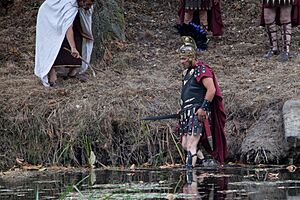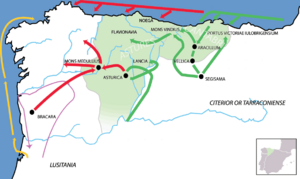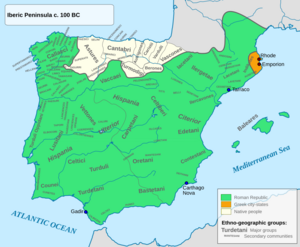Decimus Junius Brutus Callaicus facts for kids
Decimus Junius Brutus Callaicus (born around 180 BC, died 113 BC) was an important Roman leader. He was a consul of the Roman Republic in 138 BC. A consul was like a top elected official in ancient Rome. Brutus was a military commander who led Roman armies in Hispania (modern-day Spain and Portugal) and Illyria (a region in the Balkans).
He belonged to a political group called the Optimates. This group supported the interests of the wealthy and powerful families in Rome. They were often against the plebeian tribunes, who were elected representatives for the common people, and the populares, another group that wanted reforms to help the poor. During his time as consul, Brutus and his fellow consul, Publius Cornelius Scipio Nasica, disagreed with the plebeian tribunes. The tribunes even had both consuls put in prison! This happened because the consuls would not let the tribunes choose ten men who would be excused from joining the army. The consuls also opposed a plan to buy grain from other countries, even though food prices were rising.
Contents
Brutus's Adventures in Hispania
In 138 BC, Brutus was sent to a Roman province called Hispania Ulterior. This area is in what is now southern Spain. His job was to deal with many groups of fighters. These groups were attacking a region called Lusitania, which is in modern-day Portugal. They were inspired by a famous Lusitanian leader named Viriathus, who had fought against the Romans for many years.
Brutus could not easily chase these groups across such a huge area. So, he decided to attack their towns instead. He wanted revenge, to destroy their homes, and to get supplies for his army. He destroyed everything in his path. Women in these towns fought bravely alongside their men. Some people ran away to the mountains. When they asked for forgiveness, Brutus took their belongings as a fine.
Crossing the Rivers
In 137 BC, Brutus led his army across the River Durius (today known as the Douro River). This took him into a new region called Gallaecia, which is in modern-day northern Portugal and northwestern Spain. He also reached the River Lethe (now the Limia River). Ancient writers said he was the first Roman to even think about crossing it. The name "Lethe" was also the name of a mythical river in the underworld. Because of this, his soldiers were very superstitious and refused to cross. Brutus had to cross it himself first to show them it was safe.
He also crossed another river, probably the Minho River. Brutus then attacked a tribe called the Bracari. These people lived in southern Gallaecia. They had attacked his army's supply wagons. When some of the fighting women were captured, they chose to kill themselves and their children rather than be taken prisoner.
Many towns surrendered to Brutus, but some later rebelled. One town was Talabriga. Brutus ordered its people to hand over anyone who had deserted the army, plus prisoners, hostages, and their weapons. He also told them to leave the town. When they did not obey, he surrounded them with soldiers to scare them. He then took their horses, food, and public money. But he did give them their town back. After finishing his campaign, Brutus returned to Rome.
Building and Controlling the Land
Brutus likely moved into Lusitania from the north. He made the city of Olisipo (modern Lisbon) stronger with new defenses. He also established a fortified position at Vissaium (modern Viseu). After his campaigns, Brutus had calmed down Lusitania and southern Gallaecia. It is not fully clear how Rome kept control over these people. They were probably forced to become allies of Rome. Later, these regions became part of the Roman Empire.
Fighting the Vaccaei
In 137 BC, Brutus also got involved in a war against the Vaccaei people. They lived in Spain, not far from Lusitania. At this time, other Roman commanders were fighting the Numantine War (143–133 BC) against the Celtiberians. This war was focused on the town of Numantia, which was very hard to capture.
The consul Marcus Aemilius Lepidus Porcina was sent to continue the Numantine War. But he did not want his army to be doing nothing. He wrongly accused the Vaccaei of helping the Celtiberians. This was just an excuse to start a new war. He attacked their lands and began to surround their main city, Pallantia. Aemilius convinced Brutus, who was his brother-in-law, to join him.
Messengers from the Roman Senate arrived and warned Aemilius not to continue attacking the Vaccaei. But Aemilius sent them back to Rome, saying it would be dangerous to stop the war. The siege of Pallantia lasted a long time. The Romans ran out of food, and many men and animals died. Aemilius and Brutus eventually had to retreat, and it was a very messy withdrawal. The people of Pallantia attacked them from behind and killed many Roman soldiers. When Rome heard about this, Aemilius was called back, lost his command, and was fined. Brutus, however, was not punished.
Brutus's Family
Decimus Junius Brutus Callaicus was married to a woman named Clodia. They had at least two children: a son also named Decimus Junius Brutus and a daughter named Junia.
Other Interesting Facts
In 138 BC, a man was accused of leaving the army without permission in Hispania. He was punished severely: he was forced to walk under a yoke (a wooden frame), beaten with rods, and then sold for a very small amount of money. This was meant to be an example to other new soldiers.
Founding Valencia
In 138 BC, Decimus Junius Brutus founded a Roman colony called "Valentia Edetanorum." Today, this city is known as Valencia in Spain. The name "Valentia" means "valour" or "bravery." It was named to honor the bravery of the Roman soldiers. The city was built on the site of an older local town. Some ancient writers said that Valentia was founded to give land to soldiers who had fought under Viriathus, the Lusitanian leader.
A Great Honor
In 136 BC, the Roman Senate gave Brutus a special parade called a Roman triumph. This was a huge celebration for a victorious general. They also gave him the special nickname Callaicus (or Gallaecus). This means "winner against the Callaeci/Gallaeci" people, celebrating his victories in Gallaecia.
Brutus used the money he gained from his wars to build several public buildings in Rome. One of these was a temple near the Circus Flaminius. People believe this temple was dedicated to Hercules Callaicus. All these buildings had special writings by a famous tragic poet named Lucius Accius. Brutus also had a giant statue of the god Mars placed in this temple.
Brutus was a supporter of Lucius Accius, the poet. Accius even wrote a play called Brutus in honor of his patron. The play was about Lucius Junius Brutus, an ancestor of Decimus Junius Brutus, who helped found the Roman Republic.
Later Life
In 129 BC, Brutus helped another Roman consul, Gaius Sempronius Tuditanus, in a war against the Iapydians. These people lived in Illyria, a region in the Alps. Although the consul first faced defeat, Brutus helped turn the tide and win a victory. This is the last time we hear about Brutus in historical records.
The famous Roman speaker Cicero mentioned that Brutus had a unique habit. He would pour out liquids as offerings to the dead in December, instead of February, which was the usual time. Some historians wondered why he did this. Perhaps it was because December was dedicated to Saturn, a god connected to the underworld. Or maybe Brutus wanted to give the dead the "first-fruits" of the fun festivals held in December.
See also
 In Spanish: Décimo Junio Bruto Galaico para niños
In Spanish: Décimo Junio Bruto Galaico para niños
- Junia gens
- Lusitanians
- Quintus Sertorius
- Viriathus
- Timeline of Portuguese history
 | Emma Amos |
 | Edward Mitchell Bannister |
 | Larry D. Alexander |
 | Ernie Barnes |




